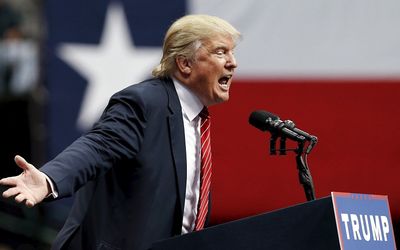Trump’s rise spooks Europe as sideshow turns serious
by Agency Staff,
2016-03-03 14:32:13.0
LONDON — Europe’s bemusement at the rise of Donald Trump has switched to concern as his presidential campaign has gained ground in what observers said was a warning to traditional parties about ignoring populists.
German Foreign Minister Frank-Walter Steinmeier this week spoke about the "politics of fear" in the US campaign in a thinly veiled reference to Mr Trump and drew parallels to the rise of European demagogues.
"In Germany and in Europe, something is gaining momentum in our domestic politics. And to be honest, I am also seeing it here in the US during the campaign: it’s the politics of fear," he told university students during a visit to Washington.
European commentators have also issued increasingly stark warnings in recent days as the once-improbable prospect of the billionaire clinching the Republican presidential nomination is looking ever more likely.
Financial Times columnist Martin Wolf said it would be a "global disaster" if Mr Trump became president, calling him "grossly unqualified" and "a promoter of paranoid fantasies, a xenophobe and an ignoramus".
Mr Wolf drew possible historical comparisons with the end of the Roman Republic and even the rise of Adolf Hitler, warning: "American ‘Caesarism’ has now become flesh. It seems a worryingly real danger today."
Other commentators looked closer to home.
"In his own way, Mr Trump is a whistle-blower," French daily Le Figaro said in a front-page editorial.
"He has reminded European political elites that it is dangerous to forget the language of those who vote for them," the newspaper said on Tuesday.
"‘Populist’ leaders can rally those beyond their political base and it is dangerous to reduce them to their caricature," it said, adding: "We have entered a time when we must be wary of the ‘impossible’."
The Parisian newspaper said: "In France we love to mock Donald Trump, his crazy hairdo, his plastic wives, his tirades out of a low-budget western.
"If it is good to laugh, it can also be useful to open our eyes, especially in a country that has given a third of its votes to the National Front," it said.
The French far-right party’s co-founder Jean-Marie le Pen last week gave his stamp of approval to Mr Trump.
"If I was American I would vote for Donald Trump ... may God protect him," tweeted the fiery 87-year-old, who has now been replaced as National Front leader and expelled from the party by his daughter Marine.
Swedish economist Sandro Scocco, a member of the left wing think tank Arena, also likened Mr Trump’s electorate to supporters of the far right in Sweden who feel betrayed by the mainstream parties.
"When the middle class begins to vote for Mr Trump, we have problems," he said, blaming growing income inequality and adding that far-right voters in Sweden "have every reason to be dissatisfied".
German daily Die Welt said both Mr Trump and Europe’s far-right and populist movements represented "a desire for revenge against arrogant elites".
The Nightmare Continues ran a headline in the Frankfurter Allgemeine Zeitung on Wednesday, while the weekly Der Spiegel said Mr Trump was "the leader of an authoritarian movement full of hatred".
"His America would be frightening," Der Spiegel said.
Many commentators focused their indignation on Mr Trump’s comments about barring Muslims from entering the US made just days after a couple believed to have been inspired by the Islamic State group killed 14 people in California in December.
In Britain, Prime Minister David Cameron has branded the comments "divisive, stupid and wrong" and a petition to bar Mr Trump from visiting the country has so far garnered more than 580,000 signatures.
Guardian columnist Deborah Orr said Mr Trump and advocates of a British exit from the European Union (EU) — or Brexit — were "cut from the same cloth".
She compared Mr Trump’s rhetoric to the concern about the influx of workers in Britain from Eastern Europe ahead of an EU membership referendum on June 23. "The reason why Britain doesn’t have a Trump is because the discontents that Trump voices in the US are voiced here in a more coded way — as opposition to the EU."
AFP

Donald Trump. Picture: REUTERS
LONDON — Europe’s bemusement at the rise of Donald Trump has switched to concern as his presidential campaign has gained ground in what observers said was a warning to traditional parties about ignoring populists.
German Foreign Minister Frank-Walter Steinmeier this week spoke about the "politics of fear" in the US campaign in a thinly veiled reference to Mr Trump and drew parallels to the rise of European demagogues.
"In Germany and in Europe, something is gaining momentum in our domestic politics. And to be honest, I am also seeing it here in the US during the campaign: it’s the politics of fear," he told university students during a visit to Washington.
European commentators have also issued increasingly stark warnings in recent days as the once-improbable prospect of the billionaire clinching the Republican presidential nomination is looking ever more likely.
Financial Times columnist Martin Wolf said it would be a "global disaster" if Mr Trump became president, calling him "grossly unqualified" and "a promoter of paranoid fantasies, a xenophobe and an ignoramus".
Mr Wolf drew possible historical comparisons with the end of the Roman Republic and even the rise of Adolf Hitler, warning: "American ‘Caesarism’ has now become flesh. It seems a worryingly real danger today."
Other commentators looked closer to home.
"In his own way, Mr Trump is a whistle-blower," French daily Le Figaro said in a front-page editorial.
"He has reminded European political elites that it is dangerous to forget the language of those who vote for them," the newspaper said on Tuesday.
"‘Populist’ leaders can rally those beyond their political base and it is dangerous to reduce them to their caricature," it said, adding: "We have entered a time when we must be wary of the ‘impossible’."
The Parisian newspaper said: "In France we love to mock Donald Trump, his crazy hairdo, his plastic wives, his tirades out of a low-budget western.
"If it is good to laugh, it can also be useful to open our eyes, especially in a country that has given a third of its votes to the National Front," it said.
The French far-right party’s co-founder Jean-Marie le Pen last week gave his stamp of approval to Mr Trump.
"If I was American I would vote for Donald Trump ... may God protect him," tweeted the fiery 87-year-old, who has now been replaced as National Front leader and expelled from the party by his daughter Marine.
Swedish economist Sandro Scocco, a member of the left wing think tank Arena, also likened Mr Trump’s electorate to supporters of the far right in Sweden who feel betrayed by the mainstream parties.
"When the middle class begins to vote for Mr Trump, we have problems," he said, blaming growing income inequality and adding that far-right voters in Sweden "have every reason to be dissatisfied".
German daily Die Welt said both Mr Trump and Europe’s far-right and populist movements represented "a desire for revenge against arrogant elites".
The Nightmare Continues ran a headline in the Frankfurter Allgemeine Zeitung on Wednesday, while the weekly Der Spiegel said Mr Trump was "the leader of an authoritarian movement full of hatred".
"His America would be frightening," Der Spiegel said.
Many commentators focused their indignation on Mr Trump’s comments about barring Muslims from entering the US made just days after a couple believed to have been inspired by the Islamic State group killed 14 people in California in December.
In Britain, Prime Minister David Cameron has branded the comments "divisive, stupid and wrong" and a petition to bar Mr Trump from visiting the country has so far garnered more than 580,000 signatures.
Guardian columnist Deborah Orr said Mr Trump and advocates of a British exit from the European Union (EU) — or Brexit — were "cut from the same cloth".
She compared Mr Trump’s rhetoric to the concern about the influx of workers in Britain from Eastern Europe ahead of an EU membership referendum on June 23. "The reason why Britain doesn’t have a Trump is because the discontents that Trump voices in the US are voiced here in a more coded way — as opposition to the EU."
AFP




















Change: 0.69%
Change: 0.58%
Change: 0.29%
Change: 0.09%
Change: 3.09%
Data supplied by Profile Data
Change: 0.49%
Change: 0.26%
Change: 0.69%
Change: 0.00%
Change: 0.35%
Data supplied by Profile Data
Change: 0.05%
Change: -0.15%
Change: 0.04%
Change: 0.22%
Change: 0.46%
Data supplied by Profile Data
Change: 1.17%
Change: 1.70%
Change: 2.51%
Change: 0.75%
Change: 0.11%
Data supplied by Profile Data